人教版中考英语基础知识复习资料
2024年人教版中考英语总复习第一部分教材考点梳理九年级全一册Units 5~6

考点精讲2 be known for 以……闻名;为人知晓 For example, Anxi and Hangzhou are widely known for their tea. 例如, 安溪县和杭州市一样以茶而广为人知。(教材P34 Unit 5)
后接名词或动名词,表示出名的原因。相当于be be known for
教材考点梳理
九年级全一册 课时18 Units 5~6
考点精讲1 be made of 由……制成 Is it made of silver? 它是由银制成的吗?
(教材P33 Unit 5)
be made 意为“由……制成”,从制品中可以看出原材料。如: The of bottle is made of glass. 这个瓶子是由玻璃制成的。
proper forms. ( C )2. Her performance was so amazing that the whole class cheered
when she
her race.
A. canceled
be made 意为“由……制成”,从制品中一般看不出原材料。如: from Paper is made from wood. 纸是由木材制成的。
意为“在(某地)制造”,后接产地。如: The machine
be made
was made in Shanghai.
in
这台机器是在上海制造的。
be made 意为“由(某人或集体)制造”,其中by用来强调动作的 by 执行者。如: It was made by Tom. 它是由汤姆做的。
[拓展] please、 pleased、 pleasant和pleasure的用法区别
中考复习 人教版九年级英语 全册知识点归纳及习题

人教版九年级英语全册知识点归纳Unit 1 How can we become good learners?短语总结:1. good learners 优秀的学习者2. work with friends 和朋友一起学习3. study for a test 备考4.have conversations with 与……交谈5.speaking skills 口语技巧6.a little 有点儿7.at first 起初起先8.the secret to......,.......的秘诀9.because of 因为10.as well 也11.look up (在词典中等)查阅;抬头看12.so that 以便,为了13.the meaning of ……的意思14.make mistakes 犯错误15.talk to 交谈16.depend on 依靠依赖17.in common 共有的18.pay attention to 注意关注19.connect ……with ……把……联系。
20.for example 例如21.think about 考虑22.even if 即使尽管纵容23.look for 寻找24.worry about 担心担忧25.make word cards 制作单词卡片26.ask the teacher for help 向老师求助27.read aloud 大声读28.spoken English 英语口语29.give a report 作报告30.word by word 一字一字地31.so……that 如此……以至于32.fall in love with 爱上33.something interesting 有趣的事情34.take notes 记笔记35.how often 多久一次36.a lot of 许多37.the ability to do sth. 做某事的能力38.learning habits 学习习惯39.be interested in 对……感兴趣40.get bored 感到无聊41.be good at 在……方面擅长42.be afraid of 害怕43.each other 彼此互相44.instead of 代替而不是二.用法集萃1. by doing sth 通过做某事2.it +be+adj+to do sth 做某事是……的3.finish doing sth 完成某事4.what about doing sth?做某事怎么样?5.try to do sth 尽力做某事6.the +比较级,the+比较级越……,就越……7.find it+adj+to do sth 发现做某事8.be afraid of doing sth 害怕做某事9.help sb (to) do sth 帮助某人做某事10.practice doing sth 练习做某事11.keep doing sth 一直做某事12.be afraid to do sth 害怕做某事13.begin to do sth 开始做某事14.want to do sth 想要做某事15.need to do sth 需要做某事16.remember to do sth 记得做某事17.shoot 射(射着,射死等表结果)18.shoot at(瞄准)射Unit 2 I think that mooncakes are delicious!一.短语归纳1.put on 增加(体重)发胖2.care about 关心在乎3.end up 最终成为,最后处于4.not only ……but also……不但……而且……5.shoot down 射下ed to do 过去常常做……7.remind sb. of 使某人想起8.give out 分发发放9.the water festival 泼水节10.the Chinese spring festival 中国春节11.next year 明年12.sound like 听起来像13.each other 互相彼此14.in the shape of 以……的形状15.on Mid-Autumn night 在中秋之夜16.fly up to 飞向y out 摆开布置e back 回来19.as a result 结果因此20.M other’s Day 母亲节21.more and more popular 越来越受欢迎22.think of 想起认为思考23.dress up 装扮穿上盛装24.the importance of ……的重要性25.make money 挣钱26.in need 需要帮助处于困境中27.between ……and…… 在……和……之间28.the Dragon Boat Festival 龙舟节29.the lantern festival 元宵节30.like best 最喜欢31.go to ……for a vacation 去……度假32.be similar to 与……相似33.wash away 冲走洗掉34.Mid-Autumn Festival 中秋节35.shoot down 射下36.call out 大声呼喊37.the tradition of ……的传统38.at night 在夜里在晚上39.one……,the other……一个……,另一个… 40.Father’s Day 父亲节41.have to 必须不得不42.play a trick on sb 捉弄某人43.the spirit of ……的精神44.care about 关心45.wake up 醒来46.the beginning of ……的开始二.用法集萃1.感叹句式一:What+(a/an)+adj+名词(+主语+谓语+其他)!多么……的……感叹句式二:How +adj/adv+主语+谓语+其他!……多么……!2.in+时间段在……后3.give sb. sth. 给某人某物4.plan to do sth 计划做某事5.refuse to do sth 拒绝做某事6.one of +名词复数形式……之一7.it +is+名词+动词不定式(to do sth)做某事是…8.what …think of…?认为…怎么样?9.make sb do sth 让某人做某事ed to be 过去是……11.warn sb(not)to do sth告诫某人做某事12.tell sb(not)to do sth 告诉某人做某事13.decide to do sth 决定做某事14.promise to do sth 承诺、答应做某事三.语法全解1.宾语从句一.连词a.陈述语序(that)b.一般疑问句(if 或whether)c.特殊疑问句(5w,1h)二.陈述语序三.时态可跟that从句做宾语的动词:say, think, insist, wish, hope, demand, imagine, wonder, know, see, believe, agree, admit, deny, expect, explain, order, command, feel, dream, suggest, hear, mean, notice, prefer, request, require, propose, declare, report等例:I don’t know what they are looking for.Could you tell me when the train will leave?注意:当主句谓语动词是think, believe, suppose, expect 等词,而宾语从句的意思是否定时,常把否定转移至主句表示。
【精品】人教版中考英语最全知识分类汇总:重点知识点(附答案)
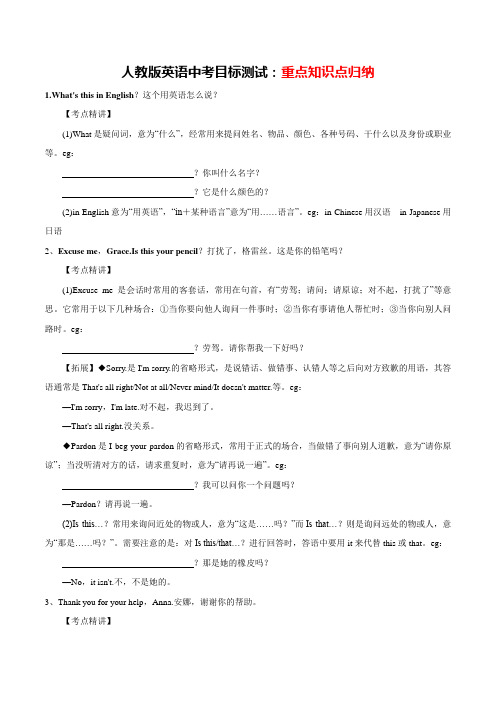
人教版英语中考目标测试:重点知识点归纳1.What's this in English?这个用英语怎么说?【考点精讲】(1)What是疑问词,意为“什么”,经常用来提问姓名、物品、颜色、各种号码、干什么以及身份或职业等。
eg:?你叫什么名字??它是什么颜色的?(2)in English意为“用英语”,“in+某种语言”意为“用……语言”。
eg:in Chinese用汉语in Japanese用日语2、Excuse me,Grace.Is this your pencil?打扰了,格雷丝。
这是你的铅笔吗?【考点精讲】(1)Excuse me是会话时常用的客套话,常用在句首,有“劳驾;请问;请原谅;对不起,打扰了”等意思。
它常用于以下几种场合:①当你要向他人询问一件事时;②当你有事请他人帮忙时;③当你向别人问路时。
eg:?劳驾。
请你帮我一下好吗?【拓展】◆Sorry.是I'm sorry.的省略形式,是说错话、做错事、认错人等之后向对方致歉的用语,其答语通常是That's all right/Not at all/Never mind/It doesn't matter.等。
eg:—I'm sorry,I'm late.对不起,我迟到了。
—That's all right.没关系。
◆Pardon是I beg your pardon的省略形式,常用于正式的场合,当做错了事向别人道歉,意为“请你原谅”;当没听清对方的话,请求重复时,意为“请再说一遍”。
eg:?我可以问你一个问题吗?—Pardon?请再说一遍。
(2)Is this…?常用来询问近处的物或人,意为“这是……吗?”而Is that…?则是询问远处的物或人,意为“那是……吗?”。
需要注意的是:对Is this/that…?进行回答时,答语中要用it来代替this或that。
eg:?那是她的橡皮吗?—No,it isn't.不,不是她的。
人教版初中英语【中考英语精品复习资料】语法基础

【中考英语精品复习资料】语法基础-1 介词是一种用来表示词与词, 词与句之间的关系的词。
在句中不能单独作句字成分。
介词后面一般有名词代词或相当于名词的其他词类,短语或从句作它的宾语。
介词和它的宾语构成介词词组,在句中作主语, 状语,表语,补语或介词宾语。
例如:Most of the students went to the classroom.大部分学生去了教室。
We play basketball on the sports ground.我们在操场上打蓝球。
介词常与动词,形容词,名词一起构成固定搭配。
belong to 属于rely on 依靠talk to 同...谈话be afraid of 害怕be strict with对...严格介词一般放在名词之前。
但它后面的介词宾语是疑问代词,疑问副词或者关系代词时,这些词提到了前面而只剩下介词在后了。
Where do you come from?你是哪儿人?Who are you talking to?你在跟谁谈话呢?What do you study for?你为了什么而学习?介词在英语词汇中所占比例很小,但它们的用法却非常灵活,复杂。
下列为常用介词及含义:about 关于,附近,大约,周围,随身.I have bought a book about Shakespearean.我买了一本有关莎士比亚的书。
There are about fifteen trees in the picture.图片里大约有十五棵树。
above 在....上,高出,以上,超过,在...上游. The plane is flying above the clouds.飞机在云上飞行。
I think the man is above sixty years old. 我想那人有六十多岁了。
across 横过,对面,交叉,在...的对面. Can you swim across the river?你能游过河吗?We live across the street.我们住在街的对面。
英语人教版九年级全册中考专项复习

年中考英语专习专题一Grammar Revision 名词(Nouns)考点解读:中考对于名词的考查主要侧重以下几点:1.可数名词的复数。
2. 不可数名词的量。
3.名词所有格的用法。
4. 名词的句法作用。
5.词义辨析。
6. 名词与主谓一致。
考查形式主要有:完形填空、完成句子、短文填空等题型。
复习目标:1、知道名词的分类2、掌握可数名词的复数(规则变化和不规则变化)3、掌握不可数名词数量的表达法4、了解名词所有格的用法(双重所有格和名词复数所有格)5、注意名词作主语和定语的用法教学过程:一、名词的分类名词是表示人、事物、地点或抽象概念的名称的词专有名词:表示人、地方、事物、机构、组织等名称的词。
第一个字母一般要大写。
如:Lucy 、Beijing、China、the Great Wall、等。
普通名词:表示一类人或事物、某种物质或抽象概念的名称。
如:book 、tree 等。
普通名词⎩⎪⎨⎪⎧ 可数名词⎩⎨⎧ 个体名词:chair ,book 集体名词:people ,family 不可数名词⎩⎨⎧ 物质名词:rain ,ice ,sunshine 抽象名词:love ,knowledge二、可数名词的复数形式可数名词有单数、复数两种形式。
名词复数构成形式分规则变化和不规则变化:1.名词复数的规则变化(1)一般情况加 -s 1.清辅音后读/s/map-maps book-books2.浊辅音和元音后读 /z/ bag-bags car-cars(2)以s, x,sh, ch 等结尾的词加 -es 读 /iz/bus-buses watch-watches但如果以 –ch 结尾的名词发音为 [k]时,只加 –s 。
stomach — stomachs 读 /s/(3)以辅音字母+y 结尾的词变y 为i 再加es. ies 读 /iz/party-parties baby---babies以元音字母+y 结尾的名词变复数时,直接加-s 变复数:读 /z/monkey---monkeys holiday---holidays(4)以f 或 fe 结尾的名词变复数时,去f 、 fe 加-ves 读 /vz/leaf---leaves wolf---wolveslife---lives thief---thieves但也有例外,如 roof---roofs chief---chiefs以o 结尾的名词,多数加 s 读 /z/。
中考英语复习人教版九年级单词复习知识清单

单词复习知识清单初三英语一轮复习0011.bull/bʊl/n公牛He was gored by a bull.他被公牛顶伤。
第三人称单数:bulls复数:bulls现在分词:bulling过去式:bulled过去分词:bulled2.recite/rɪˈsaɪt/vt背诵;吟诵;列举She can recite the whole poem from memory.她能背诵全诗。
第三人称单数:recites现在分词:reciting过去式:recited过去分词:recited记忆技巧:re-再,又+ cit-引用,唤起+ -e3.bee/biː/n蜜蜂The flower opens to reveal a bee.花开了,露出来一只蜜蜂。
复数:beesthe bee's knees(informal) 出类拔萃的人(或物)an excellent person or thingShe thinks she's the bee's knees (= she has a very high opinion of herself) .她自以为很了不起。
4.dewdrop/ ˈdjuːdrɒp/n露珠;水珠Mary thought his black dewdrop eyes gazed at her with great curiosity.玛丽觉得他那双乌黑的露珠眼睛带着极大的好奇心盯着她。
5.dawn/dɔːn/n黎明;开端;萌芽The troops landed at dawn.部队已在黎明登陆。
第三人称单数:dawns复数:dawns现在分词:dawning过去式:dawned过去分词:dawned6.clover/ ˈkləʊvə(r)/n三叶草Bees were buzzing in the clover.蜜蜂在三叶草丛中嗡嗡作响。
复数:cloversbe/live in clover(informal) 过舒适优裕的生活to have enough money to be able to live a very comfortable life 7.butterfly/ ˈbʌtəflaɪ/n蝴蝶The butterfly fluttered from flower to flower.蝴蝶在花丛中飞来飞去。
人教版中考英语知识点
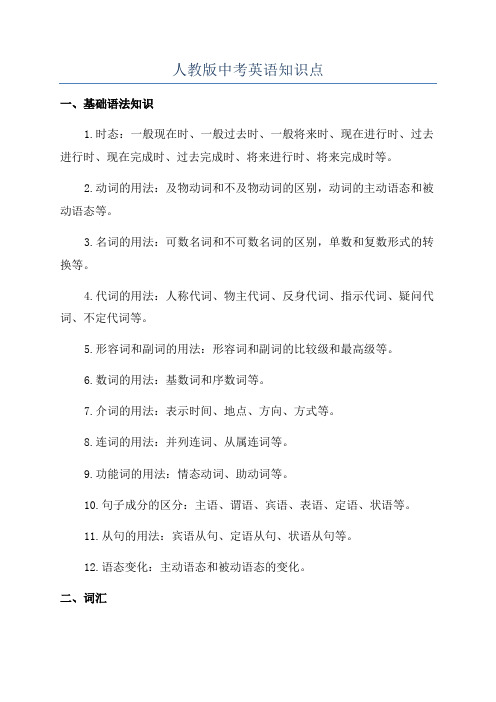
人教版中考英语知识点一、基础语法知识1.时态:一般现在时、一般过去时、一般将来时、现在进行时、过去进行时、现在完成时、过去完成时、将来进行时、将来完成时等。
2.动词的用法:及物动词和不及物动词的区别,动词的主动语态和被动语态等。
3.名词的用法:可数名词和不可数名词的区别,单数和复数形式的转换等。
4.代词的用法:人称代词、物主代词、反身代词、指示代词、疑问代词、不定代词等。
5.形容词和副词的用法:形容词和副词的比较级和最高级等。
6.数词的用法:基数词和序数词等。
7.介词的用法:表示时间、地点、方向、方式等。
8.连词的用法:并列连词、从属连词等。
9.功能词的用法:情态动词、助动词等。
10.句子成分的区分:主语、谓语、宾语、表语、定语、状语等。
11.从句的用法:宾语从句、定语从句、状语从句等。
12.语态变化:主动语态和被动语态的变化。
二、词汇1.常用词汇的记忆:时态、语态、动词、名词、代词、形容词、副词、介词、连词、感叹词、频度副词、情态动词、冠词、人称代词、物主代词等。
2.词义辨析:同义词和近义词的辨析。
3.词根、词缀的了解和运用。
4.拓展词汇:同义词、反义词、接近词、派生词等。
三、听力技巧1.正确使用听力材料前的时间,通过查阅听力材料的背景信息,对题目进行适当的预测。
2.注意听力材料的主要内容,抓住关键词,同时注意关注细节。
3.学会辨别转折词、数词、位置、时间等关键信息。
4.通过听力材料获得答案时,要注意时态的转换。
四、阅读技巧1.对题目进行预测,通过阅读标题、段落的开头和结尾等来猜测文章的主旨。
2.快速阅读文章,抓住关键词和短语。
3.根据题目要求找出关键信息,定位答案。
4.了解文章的基本结构,掌握一些常见的表达方式和句式结构。
5.注意阅读文章中的标点符号和连接词,理解长难句的意思。
五、写作技巧1.选择题材,在写作前进行头脑风暴,确定写作的主题和中心思想。
2.合理组织写作框架,包括开头、主体和结尾,注意段落之间的过渡。
最新备战中考——新人教版九年级英语全册知识点归纳及习题资料

新人教版九年级英语全册知识点归纳及习题(最新)Unit 1 How can we become good learners?短语总结:1. good learners 优秀的学习者2. work with friends 和朋友一起学习3. study for a test 备考4.have conversations with 与……交谈5.speaking skills 口语技巧6.a little 有点儿7.at first 起初起先8.the secret to......,.......的秘诀9.because of 因为10.as well 也11.look up (在词典中等)查阅;抬头看12.so that 以便,为了13.the meaning of ……的意思14.make mistakes 犯错误15.talk to 交谈16.depend on 依靠依赖17.in common 共有的18.pay attention to 注意关注19.connect ……with ……把……联系。
20.for example 例如21.think about 考虑22.even if 即使尽管纵容23.look for 寻找24.worry about 担心担忧25.make word cards 制作单词卡片26.ask the teacher for help 向老师求助27.read aloud 大声读28.spoken english 英语口语29.give a report 作报告30.word by word 一字一字地31.so……that 如此……以至于32.fall in love with 爱上33.something interesting 有趣的事情34.take notes 记笔记35.how often 多久一次36.a lot of 许多37.the ability to do sth. 做某事的能力38.learning habits 学习习惯39.be interested in 对……感兴趣40.get bored 感到无聊41.be good at 在……方面擅长42.be afraid of 害怕43.each other 彼此互相44.instead of 代替而不是二.用法集萃1. by doing sth 通过做某事2.it +be+adj+to do sth 做某事是……的3.finish doing sth 完成某事4.what about doing sth?做某事怎么样?5.try to do sth 尽力做某事6.the +比较近,the+比较近越……,就越……7.find it+adj+to do sth 发现做某事8.be afraid of doing sth 害怕做某事9.help sb (to) do sth 帮助某人做某事10.practice doing sth 练习做某事11.keep doing sth 一直做某事12.be afraid to do sth 害怕做某事13.begin to do sth 开始做某事14.want to do sth 想要做某事15.need to do sth 需要做某事16.remember to do sth 记得做某事17.shoot 射(射着,射死等表结果)18.shoot at(瞄准)射Unit1 检测题一.单项选择1.—_______ do you study English? —By listening to tapes.A. HowB. WhereC. WhenD. Why2.You can improve your English practicing more.A.byB.withC.ofD.in3. Why not practice your _________English in _________ English-speaking country?A. speaking, aB. speaking, anC. spoken, an4. ________conversations with others is one of the secrets to _________a successful learner.A. Practice, becomeB. Practice, becomingC. Practicing, becoming5 ---There’re a few new words in the article? ---What about _________in your dictionary?A. looking it upB. looking up itC. looking them up6. We’ll go out to play _________ it rains tomorrow.A. soB. unlessC. because7. Can you ________which is the right answer to the question?A. look forB. findC. find out8. Jenny used to be afraid to ________in class, so she always ________nothing.A. speak, talkedB. speak, saidC. say, spoke9.— Why not listen to BBC news to improve your listening skills?—It’s ________ difficult _______ I can’t follow.A. too; toB. so; thatC. such; that10. A good learner often thinks about ________he needs to practice more.A. thatB. whatC. how11.--I’m going to listen _______the tape.--OK. Remember to listen ________the key words.A. to, toB. to ,forC. for, to12. ________or not you can learn well depends on your learning habits.A. IfB. WeatherC. Whether13. I have finished _________my report. May I start to learn ________the guitar?A. writing, playingB. writing, to playC. to write, playing14. ---I often make mistakes _______grammar.---Why not ask your teacher _______help?A. in, toB. in, forC. at, to15. _________write down the new words in your notebook?A. Would you likeB. How aboutC. Could you please16. ---Jack used to have ________writing practice.---Yes, and he had learned _________.A. a lot of, a lot ofB. a lot of, a lotC. a lot, a lot of17. The more careful you are, ________mistakes you’ll make.A. fewerB. the fewerC. the less18. Good learners aren’t afraid _______mistakes. Instead, they learn ________mistakes.A. of making, inB. to make, fromC. to make, in19. For the first time, pay attention _________quickly to get the main ideas.A. to readB. readingC. to reading20.I discovered that listening to is the secret language learning.A.something intresting, toB.interesting something, toC.something interested, ofD.interested something of21.Jenny found it very easy English well.A.learningB.to learnC.learnD.learned22. He_____ with the girl with golden hair and will soon get married____ her.A. falls in love; toB. is in love; toC. loves; withD. loves; to23. My father thinks _____ is a great way to learn English.A. study grammar.B. I study grammar.C. studying grammar.D. studies grammar24 Why not ___ your teacher for help when you can’t finish _____ it by yourself?A. ask; writeB. to ask; writingC. ask; writingD. asking; write25. I wonder if I can learn English well.—. All things are difficult before they are easy.A. I am afraid soB. You’re slowC. It takes timeD. It’s a piece of cake26 You’ll find _____________ easy to learn it well.A. thatB. itsC. itD. this27. –I don’t have a partner to practice English ______________.---Why not join an English language club to practice _______________?A. /; speakingB. with; to speakC. /; to speakD. with; speaking28. ---She hardly makes mistakes _________English grammar.---No, it seems that she was born ________the ability to learn languages.A. in, withB. with, inC. in, inD. with, with二用所给单词的适当形式填空。
中考英语复习 第一篇 语言基础知识 第16课 九年级 Units 3-4基础知识-人教版初中九年级全
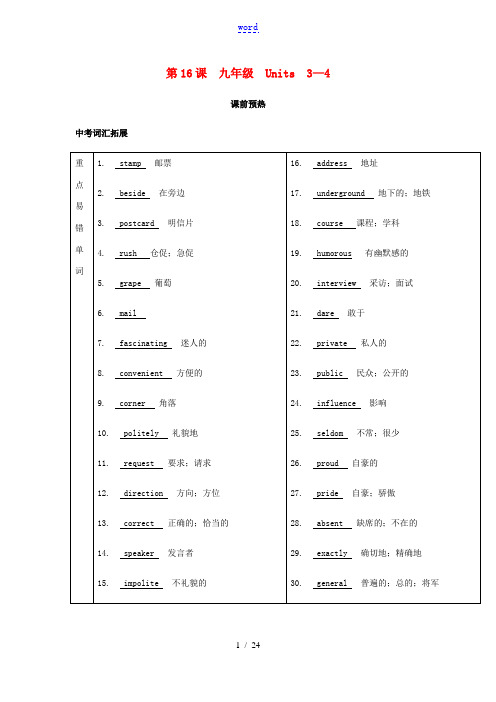
第16课九年级 Units 3—4课前预热中考词汇拓展中考词组短语中考句型回顾课堂突破中考重点单词与短语一、waste的用法【例句展示】1. When he was in the middle school, he wasted a lot of time. 他在中学时浪费了很多时间。
2. Don’t throw waste chemicals into rivers.不要把废弃的化学物品扔进河里。
3. We all think it’s a waste of time and money.我们都认为这事既浪费时间又浪费金钱。
4. My parents tell me not to waste time watching TV. 我的父母告诉我不要浪费时间看电视。
【精讲辨析】1. waste作动词,意为“浪费”。
2. waste作形容词,意为“废弃的;丢弃的;无用的”。
3. waste作名词,意为“废弃物;废料”。
4. waste... (in) doing sth.浪费……做某事。
【活学活用】用waste的适当形式填空。
1. Be careful not__________ paper.2. Don’t__________ your time in playing puter games.3. It’s a__________ of time.二、dare的用法【例句展示】1. We must dare to think, speak and act.我们必须敢想、敢说、敢做。
2. He doesn’t dare (to) say anything.他什么也不敢说。
3. We all know she was wrong, but none of us dared (to) tell her.我们都知道她错了,但我们没有一个人敢对她说。
【精讲辨析】dare为实义动词,意为“敢于;胆敢”。
dare to do sth. 意为“敢于做某事”,其中to有时可以省略(尤其是在否定句或疑问句中)。
中考英语语法知识归纳总结人教版

中考英语语法知识归纳总结人教版中考英语语法知识归纳总结(人教版)1. 一般现在时(Simple Present Tense)一般现在时用于描述经常性或总是发生的动作或情况。
主语为第三人称单数时,动词要加s或es。
2. 一般过去时(Simple Past Tense)一般过去时用于过去发生的动作或状态。
动词的过去式通常是加ed,但也存在一些不规则动词。
3. 现在进行时(Present Continuous Tense)现在进行时用于描述现在正在进行的动作,动词后要加ing。
4. 一般将来时(Simple Future Tense)一般将来时用于表示将来发生的动作,通常在动词前加will或be going to。
5. 情态动词(Modal Verbs)情态动词是一类特殊的动词,用于表示能力、可能性、许可、义务、建议等。
常见的情态动词有can、could、may、might、shall、should、will、would、must等。
6. 被动语态(Passive Voice)被动语态是指不直接说明动作的主体,而是将动作所受的影响或动作的承受者放在句子的主语位置。
主动句的主语变为被动句的宾语,谓语动词由“be+过去分词”构成。
7. 状语从句(Adverbial Clauses)状语从句用于修饰句子中的动词、形容词或副词,常见的包括时间状语从句、地点状语从句、条件状语从句、原因状语从句、结果状语从句等。
8. 定语从句(Adjective Clauses)定语从句用于修饰名词或代词,来限定或说明其意义。
引导定语从句的关联词有who、which、that、whose等。
9. 名词性从句(Noun Clauses)名词性从句用作句子的主语、宾语、表语等成分。
常见的名词性从句有主语从句、宾语从句、表语从句和同位语从句等。
10. 直接引语和间接引语(Direct and Indirect Speech)直接引语是直接引述别人的话,需用引号括起来;间接引语是将别人的话间接转述,需进行相应的句法和时态变化。
人教版初中英语九年级全册-中考英语一轮复习语法知识点

初三全册语法知识点
Grade 9
Unit 1 How can we become good learners?
Verb +bywith gerund动词+by doing sth.动名词,通过…
◉短语动词
不及物动词+副词(其后不加宾语)
breakout爆发come up(计划、建议被)提出fall behind落后
3.一般将来时的被动语态:由“shall/will/be going to/be to be+过去分词”构成。shall用于第一人称,will用于各种人称
6.某些习惯用法中(有些习惯用法常以被动形式出现,强调存在的状态)
被动语态的习惯搭配
be determined to do决心做
be interested in对……感兴趣
be seated...坐好
be dressed in...穿着……
三、被动语态的常用句式
1.普通句式
(1)肯定句式:主语+be+过去分词+其他。
8.过去完成时的被动语态:由“had been+过去分词”构成
二.被动语态的用法
下列情况下通常使用被动语态。
1.不知道动作的执行者或虽然知道动作的执行者但没有必要说出时
2.当强调动作承受者时,常用by引出动作的发出者
3.当动作的执行者是无生命名词时
4.当动作的执行者是泛指或很模糊时
5.出于礼貌不便提及动作执行者时
be+过去分词”既可表示动作,也可表示状态,但“get+过去分词”只能表示动作。
Unit 6 When was it invented?
Passive voice (past tense)被动语态一般过去时
人教版中考一轮复习英语九年级Unit 2 基础知识

Unit 2基础知识一.根据提示完成句子。
1.Ben decided to buy his father a t and a suit on Father's Day.2. Ice cream is my favorite d .3.Mo Yan is a famous writer and we all ahim very much .4. Peter l his schoolbag on the desk and went out quickly as soon as he came back.5. This pair of socks feel comfortable and its price is only one p .6. It's natural to feel nervous when a sstops you on the street suddenly.7. Tony has a big family and he plans to visit his r this Saturday.8. Let me pay for the dinner. It's my(请客).9. As teenagers we should learn to protect and (传播)our traditional culture。
10. Friends are those people who give us(温暖)and care us when we feel down.11.In order to make his new (小说) closer to life,the writer collected many stories from the real life.12. Mr.Smith is often on (生意),so he doesn’t have too much time to be together withhis family .13.For some western children, (圣诞节) is the most important festival in a year. 14.Jack got lots of ( present ) on his birthday .He liked them very much.15.Mr.Green (warn ) us not to play by the river yesterday because it was dangerous.16.Our teacher never (punish )us for what we have done wrong .Instead ,she helps us learn from it.17.The dog is (lie) at the door and enjoying the sunshine.18.The flowers outside the house are all (die) because of the dry weather .19.She asks w (是否) I need help .20. The cake is in the s of the heart . 二.翻译句子1.关于中秋节的民间故事有很多.There are about the Mid Autumn Festival.2.不良的饮食习惯会使人们体重增加,所以我们最好健康饮食.By eating habits make peopleweight, so we'd better eat healthily.3.在中国的一些地方,我们相信舞狮可以带来好运和成功。
人教版九年级英语中考复习提纲(精华整理版)
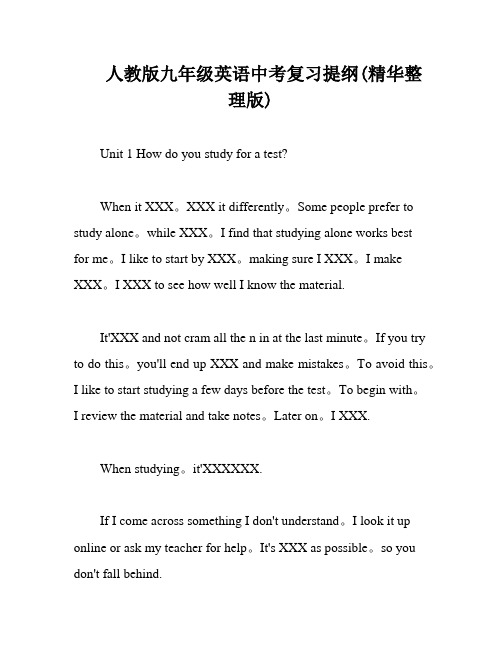
人教版九年级英语中考复习提纲(精华整理版)Unit 1 How do you study for a test?When it XXX。
XXX it differently。
Some people prefer to study alone。
while XXX。
I find that studying alone works bestfor me。
I like to start by XXX。
making sure I XXX。
I make XXX。
I XXX to see how well I know the material.It'XXX and not cram all the n in at the last minute。
If you try to do this。
you'll end up XXX and make mistakes。
To avoid this。
I like to start studying a few days before the test。
To begin with。
I review the material and take notes。
Later on。
I XXX.When studying。
it'XXXXXX.If I come across something I don't understand。
I look it up online or ask my teacher for help。
It's XXX as possible。
so you don't fall behind.Overall。
studying requires time and effort。
But if you try your best and study consistently。
you'll be well-prepared for any test.Unit 2 I used to be afraid of the darkWhen I was younger。
中考人教版英语知识点归纳总结
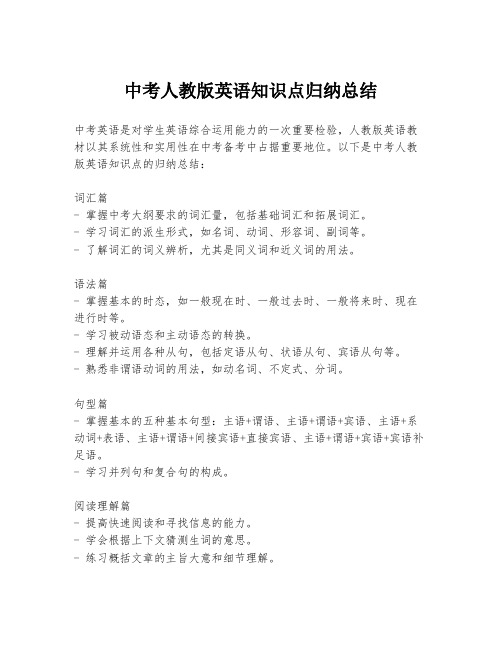
中考人教版英语知识点归纳总结中考英语是对学生英语综合运用能力的一次重要检验,人教版英语教材以其系统性和实用性在中考备考中占据重要地位。
以下是中考人教版英语知识点的归纳总结:词汇篇- 掌握中考大纲要求的词汇量,包括基础词汇和拓展词汇。
- 学习词汇的派生形式,如名词、动词、形容词、副词等。
- 了解词汇的词义辨析,尤其是同义词和近义词的用法。
语法篇- 掌握基本的时态,如一般现在时、一般过去时、一般将来时、现在进行时等。
- 学习被动语态和主动语态的转换。
- 理解并运用各种从句,包括定语从句、状语从句、宾语从句等。
- 熟悉非谓语动词的用法,如动名词、不定式、分词。
句型篇- 掌握基本的五种基本句型:主语+谓语、主语+谓语+宾语、主语+系动词+表语、主语+谓语+间接宾语+直接宾语、主语+谓语+宾语+宾语补足语。
- 学习并列句和复合句的构成。
阅读理解篇- 提高快速阅读和寻找信息的能力。
- 学会根据上下文猜测生词的意思。
- 练习概括文章的主旨大意和细节理解。
完形填空篇- 理解上下文,把握文章大意。
- 注意词汇的固定搭配和语境中的用法。
- 练习逻辑推理和语篇理解。
写作篇- 掌握各种写作体裁,如记叙文、议论文、说明文等。
- 学习如何组织文章结构,包括引言、正文和结尾。
- 练习使用恰当的连接词和过渡句。
听力篇- 练习听力理解,包括对话、短文和长对话。
- 学会捕捉关键信息和细节。
- 提高对不同口音和语速的适应能力。
口语篇- 练习日常会话和情景对话。
- 学习正确的语音和语调。
- 增强语言的流利度和自然度。
复习策略篇- 制定合理的复习计划,均衡各个知识点的学习。
- 定期进行模拟测试,检验学习效果。
- 分析错误,查漏补缺,不断改进。
结束语:中考英语的备考是一个系统工程,需要学生在词汇、语法、句型、阅读、写作、听力和口语等多个方面进行综合训练。
希望以上的知识点归纳总结能够帮助学生更好地复习和准备中考,取得理想的成绩。
中考人教版英语复习资料.doc
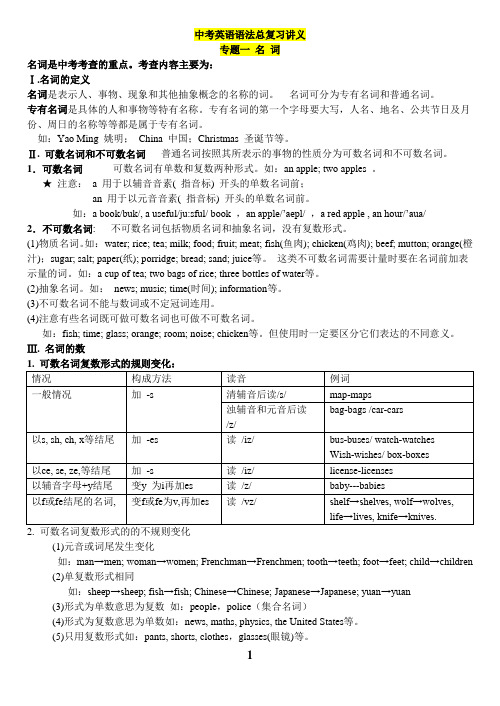
中考英语语法总复习讲义专题一名词名词是中考考查的重点。
考查内容主要为:Ⅰ.名词的定义名词是表示人、事物、现象和其他抽象概念的名称的词。
名词可分为专有名词和普通名词。
专有名词是具体的人和事物等特有名称。
专有名词的第一个字母要大写,人名、地名、公共节日及月份、周日的名称等等都是属于专有名词。
如:Yao Ming 姚明;China 中国;Christmas 圣诞节等。
Ⅱ. 可数名词和不可数名词普通名词按照其所表示的事物的性质分为可数名词和不可数名词。
1.可数名词可数名词有单数和复数两种形式。
如:an apple; two apples 。
★注意:a 用于以辅音音素( 指音标) 开头的单数名词前;an 用于以元音音素( 指音标) 开头的单数名词前。
如:a book/buk/, a useful/ju:sful/ book ,an apple/’aepl/ ,a red apple , an hour/’aua/2.不可数名词: 不可数名词包括物质名词和抽象名词,没有复数形式。
(1)物质名词。
如:water; rice; tea; milk; food; fruit; meat; fish(鱼肉); chicken(鸡肉); beef; mutton; orange(橙汁);sugar; salt; paper(纸); porridge; bread; sand; juice等。
这类不可数名词需要计量时要在名词前加表示量的词。
如:a cup of tea; two bags of rice; three bottles of water等。
(2)抽象名词。
如:news; music; time(时间); information等。
(3)不可数名词不能与数词或不定冠词连用。
(4)注意有些名词既可做可数名词也可做不可数名词。
如:fish; time; glass; orange; room; noise; chicken等。
人教版中考英语复习资料总汇
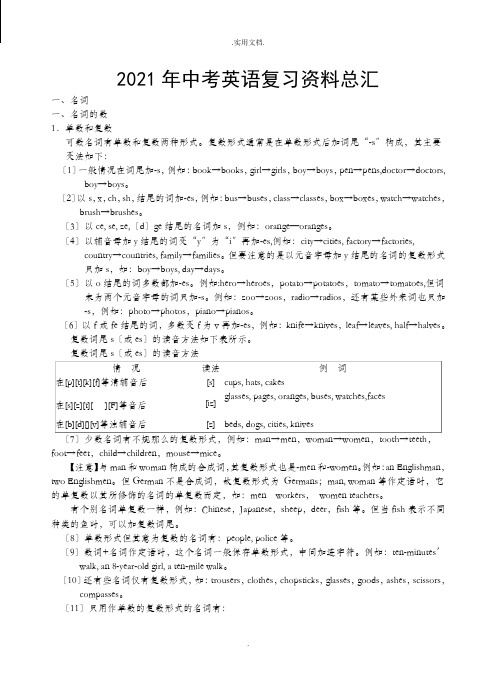
2021年中考英语复习资料总汇一、名词一、名词的数1.单数和复数可数名词有单数和复数两种形式。
复数形式通常是在单数形式后加词尾“-s〞构成,其主要变法如下:〔1〕一般情况在词尾加-s,例如:book→books,girl→girls,boy→boys,pen→pens,doctor→doctors, boy→boys。
〔2〕以s,x,ch,sh,结尾的词加-es,例如:bus→buses,class→classes,box→boxes,watch→watches,brush→brush es。
〔3〕以ce, se, ze,〔d〕ge结尾的名词加s,例如:orange—oranges。
〔4〕以辅音母加y结尾的词变“y〞为“i〞再加-es,例如:city→cities, factory→factories, country→countries, family→families。
但要注意的是以元音字母加y结尾的名词的复数形式只加s,如:boy→boys, day→days。
〔5〕以o结尾的词多数都加-es。
例如:hero→heroes,potato→potatoes,tomato→tomatoes,但词末为两个元音字母的词只加-s。
例如:zoo→zoos,radio→radios,还有某些外来词也只加-s,例如:photo→photos,piano→pianos。
〔6〕以f或fe结尾的词,多数变f为v再加-es,例如:knife→knives,leaf→leaves, half→halves。
复数词尾s〔或es〕的读音方法如下表所示。
复数词尾s〔或es〕的读音方法foot→feet,child→children,mouse→mice。
【注意】与man和woman构成的合成词,其复数形式也是-men和-women。
例如:an Englishman,two Englishmen。
但German不是合成词,故复数形式为Germans;man, woman等作定语时,它的单复数以其所修饰的名词的单复数而定,如:men workers,women teachers。
(完整word版)中考人教版英语复习资料
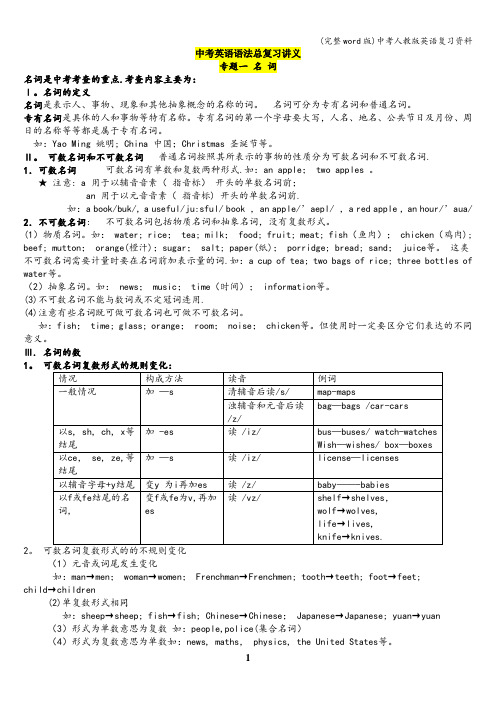
中考英语语法总复习讲义专题一名词名词是中考考查的重点.考查内容主要为:Ⅰ。
名词的定义名词是表示人、事物、现象和其他抽象概念的名称的词。
名词可分为专有名词和普通名词。
专有名词是具体的人和事物等特有名称。
专有名词的第一个字母要大写,人名、地名、公共节日及月份、周日的名称等等都是属于专有名词。
如:Yao Ming 姚明; China 中国;Christmas 圣诞节等。
Ⅱ。
可数名词和不可数名词普通名词按照其所表示的事物的性质分为可数名词和不可数名词.1.可数名词可数名词有单数和复数两种形式.如:an apple; two apples 。
★ 注意: a 用于以辅音音素(指音标)开头的单数名词前;an 用于以元音音素(指音标) 开头的单数名词前.如:a book/buk/, a useful/ju:sful/ book ,an apple/’aepl/ ,a red apple , an hour/’aua/ 2.不可数名词: 不可数名词包括物质名词和抽象名词,没有复数形式。
(1)物质名词。
如: water; rice; tea; milk; food; fruit; meat; fish(鱼肉); chicken(鸡肉); beef; mutton; orange(橙汁);sugar; salt; paper(纸); porridge; bread; sand; juice等。
这类不可数名词需要计量时要在名词前加表示量的词.如:a cup of tea; two bags of rice; three bottles of water等。
(2)抽象名词。
如: news; music; time(时间); information等。
(3)不可数名词不能与数词或不定冠词连用.(4)注意有些名词既可做可数名词也可做不可数名词。
如:fish; time; glass; orange; room; noise; chicken等。
英语人教版九年级全册中考专项复习
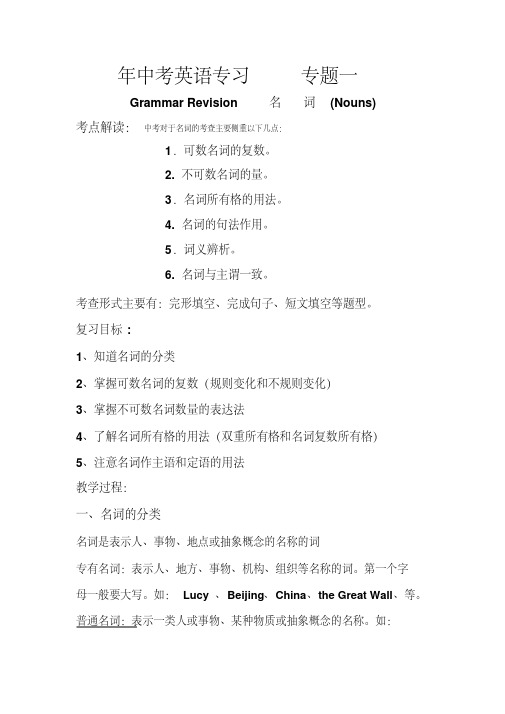
年中考英语专习专题一
Grammar Revision 名词(Nouns)
考点解读:中考对于名词的考查主要侧重以下几点:
1.可数名词的复数。
2. 不可数名词的量。
3.名词所有格的用法。
4. 名词的句法作用。
5.词义辨析。
6. 名词与主谓一致。
考查形式主要有:完形填空、完成句子、短文填空等题型。
复习目标:
1、知道名词的分类
2、掌握可数名词的复数(规则变化和不规则变化)
3、掌握不可数名词数量的表达法
4、了解名词所有格的用法(双重所有格和名词复数所有格)
5、注意名词作主语和定语的用法
教学过程:
一、名词的分类
名词是表示人、事物、地点或抽象概念的名称的词
专有名词:表示人、地方、事物、机构、组织等名称的词。
第一个字
母一般要大写。
如:Lucy 、Beijing、China、the Great Wall、等。
普通名词:表示一类人或事物、某种物质或抽象概念的名称。
如:。
- 1、下载文档前请自行甄别文档内容的完整性,平台不提供额外的编辑、内容补充、找答案等附加服务。
- 2、"仅部分预览"的文档,不可在线预览部分如存在完整性等问题,可反馈申请退款(可完整预览的文档不适用该条件!)。
- 3、如文档侵犯您的权益,请联系客服反馈,我们会尽快为您处理(人工客服工作时间:9:00-18:30)。
初一年级上学期(7A)Unit 1---3重点词组football field 足球场World Cup 世界杯lots of friends 许多朋友be born 出生after school 放学后wake up 醒醒work hard 努力工作wear glasses 戴眼镜love dancing 爱跳舞football player 足球运动员badminton court 羽毛球场swimming pool 游泳池English club 英语俱乐部at lunchtime 在午饭时间take the bus 乘公共汽车at the weekend 在周末look happy 看上去高兴have a good time 过得愉快do morning exercises 做早操make model planes 做模型飞机the sharp teeth 锋利的牙齿Dragon Boat Festival 端午节Mid-Autumn Festival 中秋节Chinese New Year 春节be good at swimming 擅长游泳twice a week 一周两次walk her dog 遛她的狗at the volleyball court 在排球场meet up with… 与……约好见面knock on the door 敲门cut out 割出(某个形状)have fun 有乐趣rice dumplings 粽子play a trick on them 捉弄他们red packets 红包take my dog for a walk 带狗去散步like listening to music 喜欢听音乐play for 为……踢球have lessons 上课have breakfast 吃早饭in winter 在冬天listen to the radio 听收音机on October 1st在10月1日at Christmas 在圣诞节dress up as a ghost 装扮成一个鬼lion dance 狮子舞go running for half an hour跑半个小时spend…(in)doing… 花(时间或金钱)干某事enjoy playing computer games 喜欢玩电脑游戏give us some candy as a treat 用一些糖果招待我们a member of the Swimming Club 游泳俱乐部的一位成员watch football matches on TV 观看电视里的足球赛know a lot about computers 知道许多有关电脑(的知识)on the evening of October 31st 在10月31日的晚上make lanterns out oranges 用橘子做出灯笼shine through the eyes 透过眼睛闪烁着on the other side of the flash card 在幻灯卡的另一面give them a treat of some candy 用一些糖果招待他们look forward to something / doing something 期盼某事/ 期盼做某事语法精讲1、一般现在时1)一般现在时的形式主语为第三人称单数时,需在动词原形后加s或es:A. 多数动词后面加s。
如eat—eats, play—plays, swim—swims, walk—walks。
B. 以字母o, s, x, ch, sh 结尾的动词后面加es。
如do—does, go—goes, guess—guess, fix—fixes, teach—teaches, push—pushes。
C. 末尾为-y的动词分两种情况:a. 若-y前为辅音字母时,则将-y变为-i,再加-es。
如study—studies, fly—flies, cry—cries。
(-y前分别为辅音字母d, l, r。
)b. 如-y 前为元音字母时,则-y 不变,直接在-y后面加-s。
元音字母共五个。
它们是a, e, I, o, u。
如say—says, buy—buys, enjoy—enjoys。
(-y前分别为元音字母a, u, o。
)2) 一般现在时所表达的含义A. 永恒的真理或事实。
The sun comes out from the east. 太阳从东方升起。
Light travels faster than sound. 光速比声速快。
Cats eat fish. 猫吃鱼。
表述“现在时段”。
“一般现在时可用以陈述现在时段内发生或存在的事件、动作或情况。
这些事件、动作或情景说不定会无限地延续下去。
但实际上,我们的意思则是在说“这是现在存在着的状况”。
My hair is very long. 我的头发很长。
Millie lives in Beijing. Millie住在北京。
His parents work in a supermarket. 他的父母亲在一家超市里工作。
B.有规律发生的动作一般现在时可用来表示习惯性动作,也就是指不断重复的事情。
这种用法通常可与表示时间的副词或词组伴随使用,如:often, always, usually, sometimes,seldom, every day。
He gets to his company at half past eight every day. 他每天八点半到公司。
Simon always plays football after school. 西蒙放学后经常踢足球。
At the weekend, I usually go running for half an hour. 周末我通常跑步半小时。
Sometimes my mother flies a kite with me in the park.有时我妈妈和我在公园里放风筝。
2.人称代词和物主代词1)人称代词A. 人称代词分为主格和宾格两种形式。
如果是作句子主语成分的人称代词就必须使用主格形式;如果是作句子宾语成分的人称代词就必须使用宾格形式。
还有,在介词后面必须使用宾格形式。
如:She likes her dog. She often walks him. 她喜欢她的狗。
她经常带他遛遛。
(she是主格,him是宾格。
)Where are they? I can’t find them. 他们在哪里?我找不到他们。
(they、I是主格, them是宾格)Don’t worry about me! I can look after it well. 别为我担心。
我可以照看好它的。
(about和after是介词,me 和it是宾格。
)B. 习惯顺序如果主语是几个并列的人称代词时,习惯顺序是:we, you and they;you, he / she and I。
You, he and I are classmates. 你、我、他是同班同学。
C. 中性代词it的用法It除了可指代动物、事物外,还可以指时间、天气、距离或温度。
如:I have a lovely cat. I like it very much. 我有一只可爱的猫。
我非常喜欢它。
(it指动物)English is very useful. It is my favourite subject. 英语很有用。
它是我最喜爱的学科。
(it指事物)It is about five kilometers from here. 离这儿大约五公里。
(it指距离)It’s 9:00pm. I must go. 现在晚上九点了。
我必须走了。
(it指时间)How windy it is today! 今天风多大啊!(it指天气)另外,it也可用于以下情况之中:弄不清婴儿或小孩性别时:What a lovely baby it is! 多么可爱的宝宝啊!看不见对方时:--- There’s a knock on the door. Go and see who it is. --- It’s Jim.--- 有人敲门。
去看看是谁。
--- 是吉姆。
(ring!)--- Hello! Who is it? --- It’s Mary speaking. ---喂,谁呀?---是玛莉。
照片或图片中的人物:--- Who’s the little boy? --- It’s me. 那小男孩是谁?--- 是我。
2)物主代词物主代词可分为形容词性物主代词和名词性物主代词两种形式。
形容词性物主代词具有形容词的作用,只能作定语,后面必须要跟上一个名词;而名词性物主代词则具有名词的作用,可在句中作主语、表语或宾语。
换言之,名词性物主代词=形容词性物主代词+名词。
如:The red one is her car. Mine is the blue one. 红色的那辆是她的车。
我的是那辆兰色的。
(mine = my car, 且在句中作主语。
)I don’t want their answers. Tell me yours. 我不要他们的答案。
告诉我你的答案。
(yours = your answer, 且在句中作宾语。
)3. Some dogs just don’t know how to have fun.一些狗就是不懂怎么玩。
1)在此句中“how to have fun” 是know的宾语。
“疑问词+to do”形“所表达的含义相当于一个名词,因此,它可充当句子的主语成分或是宾语成分。
如:Where to look for the lost boy is still a big problem now. (作主语)去哪里找那个失踪的男孩仍是个大问题。
We are talking about which book to buy first. (作宾语) 我们在谈论先买哪本书。
2)“have fun”的“思是“嬉戏”、“娱乐”。
“un 是不可数名词,也可作定语,意为“有趣”、“逗笑”。
“:We had lots of fun at the party today! 我们今天在聚会上玩得很开心!It is a fun hat. 它是顶可笑的帽子。
4.My favourite lessons are Chinese and English.我最喜欢的课程是语文和英语。
Favourite 是形容词,意为“最喜欢的”。
“可以和“like……best”的形式替换。
如:What’s his favourite colour? His favourite colour is blue. 可转换为What colour does he like best? He likes blue best. 他最喜欢什么颜色?他最喜欢兰色。
